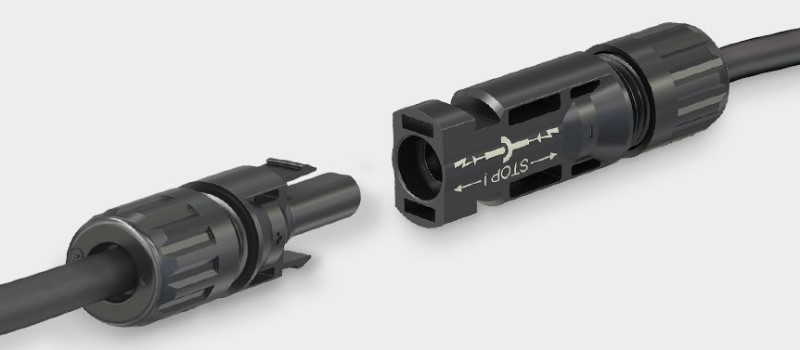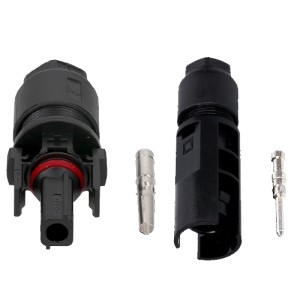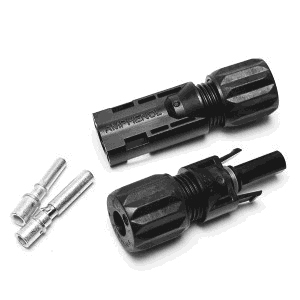Solar connectors are electrical connectors used for inter-module connections in solar PV systems, and their main function is to provide reliable electrical connections and mechanical support to ensure the normal operation and safety of the entire system. Solar panel connector is usually made of materials with good weathering performance to adapt to changes in the outdoor environment and durability requirements, and its design and specifications also need to meet international standards and industry requirements to ensure interchangeability and compatibility.
Classification by Plug-in Method
PV connectors have several types that can be categorized according to different classification criteria. However, the most common categorization criteria are classified according to the mating method. PowerHome will introduce you to some common types of solar connectors:

MC4
MC4 (Multi-Contact 4mm) connector is the most commonly used connector and is the industry standard for the entire solar panel system. It adopts a plug-and-play design with a push-lock mechanism between the male and female connectors, as well as a special anti-backlash design, which can provide good electrical connection and protection, with waterproof, corrosion-resistant, and high-temperature-resistant features. MC4 connectors are widely used in outdoor solar power plants, rooftop solar power systems, and other scenarios. Due to its safety and reliability, MC4 is currently the most popular type, and the vast majority of solar panels are compatible with it.

MC3
MC3 belongs to the older generation of connectors and has now been largely replaced by MC4 connectors. They are characterized by a snap-in locking mechanism that is less secure than the locking system of the MC4. Not only that, but MC3s also tend to have poorer weathering properties, are more prone to corrosion and wear over time, and are no longer the best choice for modern PV panels. If you happen to have a solar power system with this connector, check it for deterioration and upgrade it to MC4 if appropriate.
Tyco Solarlok
Tyco connector is the predecessor of the MC4 connector. Once acclaimed for its compatibility, choice of materials, long service life, and excellent resistance to environmental factors, this connector has gradually been superseded by MC4.
It features a gender-neutral design that allows any two connectors to be mated, and a spring-loaded design that supports rapid plugging and unplugging for good contact performance. Tyco Solarlok connectors are suitable for use in outdoor, harsh environments, and small to medium sized systems.
Amphenol H4
Amphenol H4 is also a common type of solar connector, it has reliable connection performance and durability, with high current and high voltage tolerance, and can adapt to different environmental conditions. Unlike the MC4 connector, it has a non-threaded design that allows for quick installation and disconnection. Amphenol H4 connectors are suitable for large-scale solar systems such as commercial and industrial power plants that require high power transmission.
You can visualize the difference between the above solar connectors by comparing the parameters shown in the table below:
| MC4 | MC3 | Tyco Solarlok | Amphenol H4 | |
| Cable Cross Section | 2.5-10mm² | 2.5-10mm² | 4-6mm² | 2.5-6mm² |
| Rated Current | 39-104A | 20-43A | 20-30A | 15-45A |
| Maximum Voltage | 1,000 V | 1,000 V | 1,500 V | 1,500 V |
| IP Index | IP68 | IP65 | IP65 | IP68 |
| Maximum Temperature | 221°F | 221°F | / | 248°F |
| Safety Mechanism | Plug lock | None | Plug lock | Plug lock |
| Locking/Unlocking Tool | Useful but not needed | Not Required | Required | Required |
Classification by Other Methods
Alternatively, they can be categorized using the contact method, which can be divided into:
- Pinhole connectors: The female and male connectors of the connector are designed with pin and hole contacts to ensure a reliable electrical connection.
- Spring connectors: The connectors are designed with spring contacts, making plugging and unplugging easier without losing stability.
International standard classifications are also available:
- IEC connectors: Meet the requirements of the standards set by the International Electrotechnical Commission (IEC).
- UL connectors: Meet the requirements of the standards set by the Underwriter Laboratories (UL).
- TUV connectors: Meet the requirements of the standards set by the Technischer Überwachungsverein (TUV).

To summarize, different kinds of solar panel connectors have different performance, scope of application, advantages and disadvantages. If you are shopping for the right solar connector, then we recommend you to choose MC4 solar connector, as the mainstream standard in the industry, it has unrivaled own strength and universal compatibility, will be the best choice for your personal solar power station.
(1).png)


(1).png)